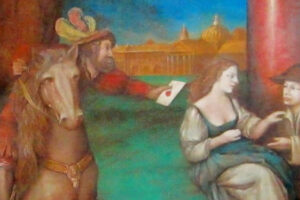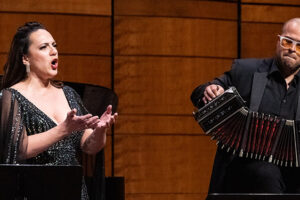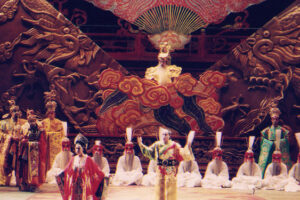

The little theater had a reputation that even Empress Maria Theresa commended. If she was pleased, Prince Esterhazy was pleased, and that in turn made Haydn happy. His operas tend to be intimate and comic, and were sometimes designed for marionettes. The grandeur, the castrati, the highfalutin sentiments of court opera would have been out of place. A visit to Vienna for Don Giovanni supposedly convinced Haydn that opera was beyond his range, and he never wrote another—but his Orlando Paladino (1782) remained popular throughout Germany for the rest of the century.
Orlando Paladino treats the operatically familiar tale of Ariosto’s warrior, distracted from his knightly destiny by (unrequited) love and the witchcraft required to knock some sense back into him, but even in this “serious” story, Haydn’s treatment is playful, near-parody, and the psychology is superficial. We behold the follies of his aristocrats and the amorous fooling of the lower class figures without uneasy reflection: They’re no realer than Alcina’s magical powers, but the tunes are lovely.
The production playing the Manhattan School of Music (through Sunday) takes as its cue a phenomenon recently written up in The New Yorker: a tendency of young paranoiacs to imagine they are constantly on camera, their lives a “reality show.” According to director Robin Guarino, Orlando suffers from this ailment, enhanced by popping pills and snorting cocaine. He therefore menaces the plighted lovers, Angelica and Medoro, and can only be cured (by the sorceress Alcina, in this version a glamorous-malevolent psychiatrist) by a dose of electroshock.

The voices are all attractive but, on Wednesday night, took some time to warm up. In Act I, there was a general shortness of breath, a sense that Haydn desired another note or two above or below each singer’s comfort zone. The decision of (I presume) director Guarino and maestro Christian Capocaccia to cut so much from the show that it could be reduced to about two hours of music and two acts (from three) served some performers better than others.
Orlando has two extended accompanied recitatives of mania followed by full arias, and Elliott Page sang them prettily, in a sizable and shapely tenor that lacked dramatic force, perhaps covered up by the crazy behavior demanded by the directorial concept. This, however, was undercut by his staring at the conductor at all times. Orlando’s madness is what drives the plot, and to have little threat behind it leaves a vacancy. His principal antagonist, Alcina, was sung by Margaret Newcomb, an impressive performer in MSM’s Nina, la pazza per amore, but her role here was reduced to one aria and a number of recitative dicta that suggested a lithe power she had little chance to display.
The star of the evening was baritone Cameron Johnson as Pasquale, Orlando’s buffo valet, who falls in love with a shepherdess (here, a supervisor with clipboard and tight jeans) named Eurilla, soprano Kerstin Bauer. Haydn wrote two of the most charming numbers in the score for them, and they tear up the town: A boastful aria for Pasquale about his prowess at singing (higher than a castrato, lower than a basso, and he must sing both ranges at those points, and does) and a flirtatious, quizzing number for Eurilla, into which bumbling Pasquale interjects the vowel sounds in sequence as monosyllabic responses.

Leela Subramaniam had the prima donna role of Angelica of Cathay, unhappy object of Orlando’s attentions, a part that included one and a half suicide attempts and much vocal display. Her sound has more body, more distinction, than many young sopranos. Her coloratura was smudgy in Act I, cleaner in Act II—this is the aspect of her voice that could use attention. Thomas Mulder was her Medoro, and his rather whitish tenor seemed proper for this ineffectual and unheroic lover—he spent much of Act II hiding under a sheet or removing his shirt.
Kidon Choi sang the rumbustious Rodomante, King of Barbary, invited in by Alcina to confront Orlando. Or that’s his role in Haydn’s setting. I was never sure of his function in this production but I was glad he was there. He had the largest, the most even and the most enjoyable voice of the entire company, a burly but lustrous baritone of the sort that thrives in later composers. (He’s sung Amonasro and Rigoletto in his native Korea.)
The MSM orchestra was well-schooled in a score that always pleased the ear without offering the sort of delicious witticisms that the contemporary Mozart seemed always to have at his fingertips.
























Comments